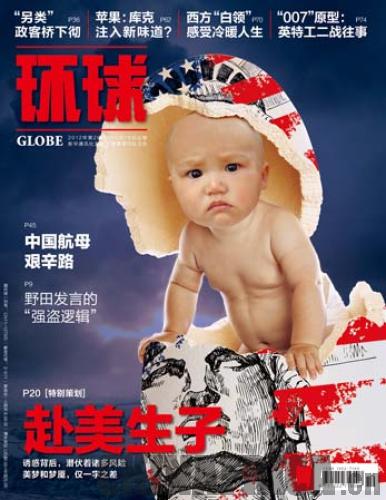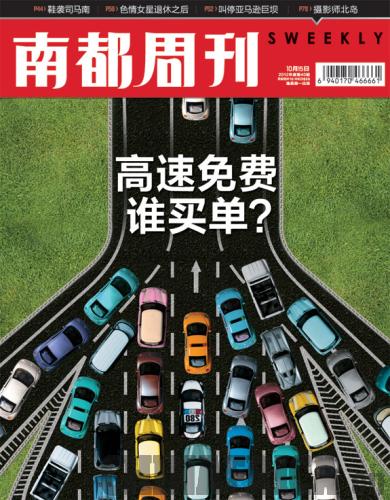|

Having Babies Abroad
Globe
October 16, 2012
The United States grants automatic citizenship to all babies born in the country regardless of the parents' nationality and race. Therefore, more and more affluent Chinese parents-to-be travel to the country to deliver babies in the pursuit of better social welfare and education for their children, or evading China's family planning policy, which restricts urban families to one child.
Globe magazine in this issue looks at this phenomenon, reminding readers of the risks involved, such as failed entry, unpredicted extra expenditures, loneliness abroad and difficulty in getting good medical care.
Pu Guangxing, Associate Professor with School of Ethnology and Sociology of Minzu University of China, maintained that with the improvement of the public services in China, the phenomenon will slow down. However, the authorities should be alert to the negative influences if social elites increasingly go abroad to have babies for foreign citizenship, as it will lead the general public to lose confidence in the nation's future.

New Breed of Migrants
South Reviews
October 10, 2012
Migrant workers are the major contributors to China's current economic achievement. As a unique phenomenon in China, this group, mainly rural surplus labor, has in the past helped the industrialization process with its low-cost workforce. Today things have changed. Those migrant workers born in the 1980s and 1990s are now playing a pivotal role in China's urbanization process.
The new generation of migrant workers is not covered by the social security system to provide them with health insurance, education or housing, which hinders them from fully integrating into city life. And born in the countryside but having been working in cities since graduation, they are unfamiliar with farm work and couldn't return to life in their rural hometown.
Another prominent change of the new generation of migrant workers is that they have high awareness of rights, as they generally received a higher education than their parents. Measures should be taken to help them integrate into cities so that they can enjoy the benefits of urbanization.
Value of Design
Global Times
October 16, 2012
The urbanization and economic development of China over the last decades has created a plethora of aesthetically displeasing buildings, reflecting a lack of domestic architectural culture. Instead of being city icons, some landmark buildings were constructed in an overly exaggerated or duplicated way, with less practical functions or no conformity to the surroundings, contaminating the landscape.
This led to a rift in architectural design in relation to the national culture. To avoid poorly designed buildings in city planning, it had to be noted that buildings represented a city's cultural tradition and aesthetic values, but not material desires or the power of authorities. Only if they reflect historical and cultural traditions, can buildings have souls and vitality and be remembered.

Limited Choice
South Metropolis Weekly
October 15, 2012
Clogged highways and crowded scenic spots were the most frequently discussed topics during the past National Day holiday, from September 30 to October 7.
Some blamed the congestion and crowding on the first-time exemption of highway tolls and the reduction in ticket prices at many scenic spots. However the magazine says that during the past year, the numbers of cars increased by 20 percent in many cities, but few highways were built in places that were frequently congested. Travelers heading for family reunions and sightseeing on the first day of the holiday made traffic worse.
The magazine argues that exemption of highway tolls and decrease in ticket prices in scenic spots could benefit middle- or low-income people. As many of these groups don't have paid holidays, they have no choice but to endure traffic during the congested holiday. The policy on paid holiday should be better implemented to solve the problem.
Trusting Doctors
Guangzhou Daily
October 17, 2012
Doctor-patient relationship is one of much contention. Under the current medical system, hospitals and doctors should be blamed for some malpractices. However, patients sometimes were also equally responsible. Some of them trusted sophisticated medical equipment more than their doctors' skills and work ethic.
Patients mistakenly took it for granted that as long as they were in hospital, their health could be guaranteed and that doctors had to cure them as they had paid. If doctors failed, they could not be forgiven. What transpired is that a cold result-oriented relationship between doctor and patient has replaced one of mutual trust and cooperation. Patients should show more confidence in doctors as it not only helps in relieving the tension with doctors, but also benefits their own physical and mental health. |